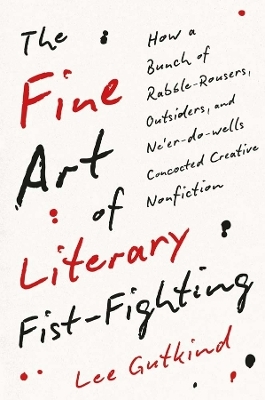
The Fine Art of Literary Fist-Fighting
How a Bunch of Rabble-Rousers, Outsiders, and Ne'er-do-wells Concocted Creative Nonfiction
Seiten
2025
Yale University Press (Verlag)
978-0-300-28191-0 (ISBN)
Yale University Press (Verlag)
978-0-300-28191-0 (ISBN)
- Noch nicht erschienen (ca. Februar 2025)
- Versandkostenfrei innerhalb Deutschlands
- Auch auf Rechnung
- Verfügbarkeit in der Filiale vor Ort prüfen
- Artikel merken
An account of the emergence of creative nonfiction, written by the “godfather” of the genre
“When [Gutkind] stops to look back on his own evolving perspective . . . [and] reflects upon his writing career, the choices he made . . . he puts himself, and us, right back in the moment—and the results are vivid, ambiguous, emotionally resonant, fascinating.”—Lucas Mann, Washington Post
In the 1970s, Lee Gutkind, a leather-clad hippie motorcyclist and former public relations writer, fought his way into the academy. Then he took on his colleagues. His goal: to make creative nonfiction an accepted academic discipline, one as vital as poetry, drama, and fiction. In this book Gutkind tells the true story of how creative nonfiction became a leading genre for both readers and writers.
Creative nonfiction—true stories enriched by relevant ideas, insights, and intimacies—offered liberation to writers, allowing them to push their work in freewheeling directions. The genre also opened doors to outsiders—doctors, lawyers, construction workers—who felt they had stories to tell about their lives and experiences.
Gutkind documents the evolution of the genre, discussing the lives and work of such practitioners as Joan Didion, Tom Wolfe, Norman Mailer, James Baldwin, Zora Neale Hurston, Rachel Carson, Upton Sinclair, Janet Malcolm, and Vivian Gornick. Gutkind also highlights the ethics of writing creative nonfiction, including how writers handle the distinctions between fact and fiction.
Gutkind’s book narrates the story not just of a genre but of the person who brought it to the forefront of the literary and journalistic world.
“When [Gutkind] stops to look back on his own evolving perspective . . . [and] reflects upon his writing career, the choices he made . . . he puts himself, and us, right back in the moment—and the results are vivid, ambiguous, emotionally resonant, fascinating.”—Lucas Mann, Washington Post
In the 1970s, Lee Gutkind, a leather-clad hippie motorcyclist and former public relations writer, fought his way into the academy. Then he took on his colleagues. His goal: to make creative nonfiction an accepted academic discipline, one as vital as poetry, drama, and fiction. In this book Gutkind tells the true story of how creative nonfiction became a leading genre for both readers and writers.
Creative nonfiction—true stories enriched by relevant ideas, insights, and intimacies—offered liberation to writers, allowing them to push their work in freewheeling directions. The genre also opened doors to outsiders—doctors, lawyers, construction workers—who felt they had stories to tell about their lives and experiences.
Gutkind documents the evolution of the genre, discussing the lives and work of such practitioners as Joan Didion, Tom Wolfe, Norman Mailer, James Baldwin, Zora Neale Hurston, Rachel Carson, Upton Sinclair, Janet Malcolm, and Vivian Gornick. Gutkind also highlights the ethics of writing creative nonfiction, including how writers handle the distinctions between fact and fiction.
Gutkind’s book narrates the story not just of a genre but of the person who brought it to the forefront of the literary and journalistic world.
Lee Gutkind has been called the “Godfather behind creative nonfiction” by Vanity Fair. He founded Creative Nonfiction magazine in 1994 and is the editor or author of more than thirty books. He lives in Pittsburgh, PA.
| Erscheint lt. Verlag | 25.2.2025 |
|---|---|
| Sprache | englisch |
| Maße | 156 x 235 mm |
| Themenwelt | Geisteswissenschaften ► Sprach- / Literaturwissenschaft ► Anglistik / Amerikanistik |
| Geisteswissenschaften ► Sprach- / Literaturwissenschaft ► Literaturwissenschaft | |
| ISBN-10 | 0-300-28191-9 / 0300281919 |
| ISBN-13 | 978-0-300-28191-0 / 9780300281910 |
| Zustand | Neuware |
| Haben Sie eine Frage zum Produkt? |
Mehr entdecken
aus dem Bereich
aus dem Bereich
Poetik eines sozialen Urteils
Buch | Hardcover (2023)
De Gruyter (Verlag)
59,95 €
Buch | Softcover (2024)
belleville (Verlag)
20,00 €


